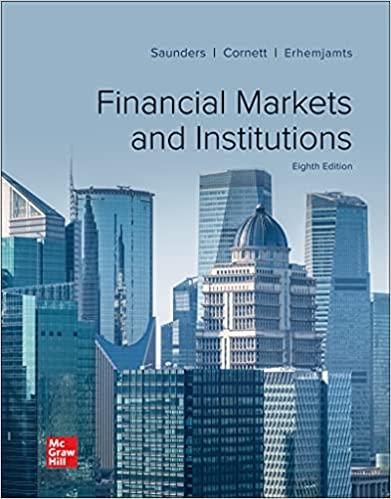Answered step by step
Verified Expert Solution
Question
1 Approved Answer
The Big Short: Role Play In 1965 Ed and Carla Langenberg took out a 20-year mortgage from Preble State Bank to purchase their first (and
The Big Short: Role Play
In 1965 Ed and Carla Langenberg took out a 20-year mortgage from Preble State Bank to purchase their first (and only) home. The down payment was 20%.
Here were the risks:
Ed and Carla:
- If they failed to make their loan payments they would lose the house.
- When the bank sold the home to recoup their loan the first 20% of loss, if any, was borne by Ed and Carla.
- Preble State Bank intended to hold the mortgage for up to 20 years. Which means
- If Ed didnt pay, they lost money.
- Which means they looked at his work history.
- They had to decide they trusted him to pay it back.
In The Big Short
- Borrowers obtained loans without effectively confirming their income.
- 0% down payments were common.
- Banks expected to write the mortgage, collect a fee, then sell the mortgage but retain servicing income. Which means
- If the borrower didnt pay, investors lost money.
- If there was a loss, given no down payment, investors lost money.
- Incremental federal government deficits (above a $300 billion norm) from 2009-2012 total about $3.9 trillion or about $12,200 for every man, woman and child or $48,800 for a family of four. At 1% = $488 interest payments per family annually, at 2% = $976 per year.
https://datalab.usaspending.gov/americas-finance-guide/deficit/trends/
QUESTIONS (There isnt a right or wrong on this)
- What are the benefits, and costs, to society of securitization of home loans?
- Compare and contrast the incentives for moral hazard in the modern, securitized system with prior practices in the 1960s from the standpoint of:
- Borrowers
- Banks
- United States (society) as a whole
- Discuss whether you believe this, or a similar situation, can be prevented in the future without resorting to a police state or massive killing off of imperfect people (which has been attempted multiple times this century)?
[Hint: Your answer cannot be a variant of people should because that never happens]
- What specific legislative or regulatory actions would you recommend to discourage excessive moral hazard?
Step by Step Solution
There are 3 Steps involved in it
Step: 1

Get Instant Access to Expert-Tailored Solutions
See step-by-step solutions with expert insights and AI powered tools for academic success
Step: 2

Step: 3

Ace Your Homework with AI
Get the answers you need in no time with our AI-driven, step-by-step assistance
Get Started


